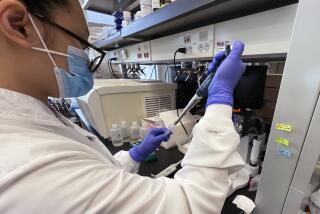House members question the reliability of new bioweapons detection system
- Share via
Reporting from Washington — A bipartisan group of House members has questioned the Trump administration’s new system for detecting anthrax or other airborne biological weapons — warning it could be “even less reliable” than the nation’s existing, problem-plagued BioWatch program.
In a letter to Kevin McAleenan, the acting secretary of Homeland Security, the four lawmakers cited a Los Angeles Times article from Feb. 15 that they said raised “questions and concerns’’ about the department’s approach.
The article disclosed that Homeland Security is moving to replace BioWatch with devices that frequently can’t distinguish between deadly pathogens and airborne pollen or paper dust, increasing the likelihood of false alarms.
The devices also failed in testing to detect tiny, unclumped anthrax spores — the type that a skilled terrorist or state-sponsored biowarfare program might produce.
In the three-page letter, sent late Friday, the House members said the details raise concerns that Homeland Security would replace BioWatch “with an even less reliable system,” one that could increase the risk of state and local authorities being forced to respond to more false alarms.
The group asked McAleenan to provide a briefing to discuss the basis for installing BioDetection 21 as a potential replacement system for BioWatch.
The letter was signed by Rep. Frank Pallone Jr. (D-N.J.), who chairs the House Energy and Commerce Committee, and three members of the panel — Reps. Diana DeGette (D-Colo.), Greg Walden (R-Ore.) and Brett Guthrie (R-Ky.).
The letter also asked McAleenan to furnish a copy of a report that was prepared by the Johns Hopkins University Applied Physics Laboratory on behalf of Homeland Security’s scientific staff.
The report documented that the devices that would be used in BioDetection 21 correctly detected small particles of viral material — simulating smallpox or other deadly viruses that could be weaponized — in only eight of 168 attempts.
The letter also noted shortcomings with BioWatch, which was installed in cities nationwide after the 2001 anthrax letter attacks, which killed five people, infected 17 others and caused closures of scores of government buildings and U.S. mail facilities.
The letter cited a 2015 report by the Government Accountability Office that identified 149 false alarms by BioWatch and “uncertainty’’ about the system’s ability to detect an actual attack.
In each of the false alarms, officials at the scene ultimately decided BioWatch was at fault. The GAO conducts investigations and audits for Congress.
BioDetection 21 has been championed as a replacement system by James F. McDonnell, an assistant secretary of Homeland Security. He has said the new devices are being put in 12 U.S. locations, although they have not been identified.
McDonnell has said he hopes to replace BioWatch and have as many as 9,000 of the new detection devices operating by 2025.
In an interview in February, McDonnell said problems with the system will be fixed as it is rolled out.
“Part of what I’m reining in the scientists a little bit on is, ‘Don’t let perfection be the enemy of the good,’ ” McDonnell said at the time. He could not be reached for comment Saturday about the congressional letter.
More to Read
Get the L.A. Times Politics newsletter
Deeply reported insights into legislation, politics and policy from Sacramento, Washington and beyond. In your inbox twice per week.
You may occasionally receive promotional content from the Los Angeles Times.











